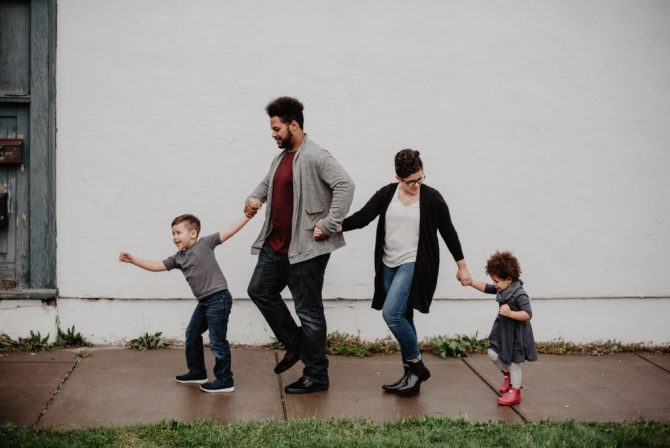
It seems befitting that May is Mental Health Awareness Month amid the pandemic. We see and hear parents daunted by homeschooling responsibilities and keeping their families healthy, safe, and secure. Guilt is rampant. Parents are exceedingly self-critical despite a lack of best practices for what they are doing.
Children are distance learning, frustrated with not being able to play with friends, and confused why playing at playgrounds is forbidden to get daily energy release. Kids in vulnerable communities may not have computer access or enough to eat without free lunches at school.
Common Sense Media, opens a new window has produced valuable resources to offer families ongoing relief and support:
- Webinar, opens a new window series
- Parent Trapped, opens a new window parenting podcast
- Research , opens a new windowarticles
Key Takeaways
Accept and embrace negative feelings. Parents often feel they need to shield their kids from bad feelings such as anxiety, fear, sadness, or worry. The reality is that these feelings are normal human emotions. The very definition of psychological health is that people have the right feeling at the right time and can deal with it. Try positive coping: talk about how you feel, live with the feeling until it is gone, then move on.
Encourage conversations. Ask your kids how they are feeling and tell them how you feel. Describe what sparked a particular emotion and name it. Equip your children with the ability to recognize and express a feeling with the associated language. Practice active listening and convey understanding in return.
Be present, be thoughtful, and be available. Your capacity to buffer stress for your children is critically important. Do things together as a family, no matter how simple or silly, to give kids the connection that is so vital at this time.
Behavior is children’s form of communication. When children are stressed, they may regress in their habits like potty training or meltdown when asked to do a simple task. It is not bad behavior; the child feels overwhelmed, and the effort is too much right now. The challenge is patience, patience, patience to give your child the empathy, love, and support they need.
Children tend to manifest physical symptoms along with stress. A caring parental response is to offer empathy and name the feeling to help kids learn a vocabulary for emotions (e.g., “I’m sorry your stomach aches. I wonder, do you feel sad?”)
Practice healthy conflict resolution. Teach kids to be a pillar: stand up for yourself while remaining respectful. If you reach an impasse with your child, perspective-taking can be helpful. Switching roles - looking at the situation from their point-of-view - will promote empathy and understanding.
Keep expectations low. For your children and yourself.
Introduce a new normal. Parents have never lived with uncertainty for such a prolonged time. Kids need stability, soothing, attention, and to be kept safe. Parents can satisfy their needs in easy and fun ways, like S’more Saturdays, jigsaw puzzle nights, or weekly video chats with grandparents. Ask your kids for ideas and help with planning.
Looking at Positives
Educators and child development professionals are observing what is working well during this period. Experts are looking at positives such as self-directed learning, experimental play, slower pace and shorter school days, and less homework (none for elementary grades). If they are possible, could they be sustained? Schools, parents, and child specialists working together could affect beneficial outcomes for the future.
As inequities in our communities are exposed, we’re stepping up to provide critical services, opens a new window. Closing the digital divide and services that effectively impact vulnerable children need to continue in the future. Explain to kids that sometimes families need assistance, and there are things we can all do to help our neighbors.
“How kids are doing is largely dependent on how their parents are doing”.
Take care of yourself to better show up for the people in your life. What does self-care look like for you? Do things that give you contentment and peace: listen to music, read a book, journal daily what you’re grateful for, practice yoga or meditation, commit to moving your body at least once per day, and take a break from the news!
We hope you've gained some degree of consolation from these suggestions.
“You’ve been successful if you can walk out of this with a family intact: a family that still cares about each other and can talk to each other.”
(Madeline Levine, Psychologist, and Author)
That, my fellow parents, is a worthy intention.
Sources
COVID-19 resources. Mental Health and Handling Social Distancing for Families, opens a new window. California Library Association [website]
Damour, Lisa & Natterson, Cara. (2020, May 20). Conversations with Common Sense: Making Room for Uncomfortable Emotions, opens a new window. Common Sense Media [webinar]
Kamenetz, Anya (narrator). (2020, May 14). Conversations with Common Sense: A National Town Hall for Parents, opens a new window. Common Sense Media [webinar]
Knorr, Caroline. (2020, April 15). How to Help Kids Mental Health During the Pandemic, opens a new window. Common Sense Media [blog]
Photo by Emma Bauso from Pexels


Add a comment to: Kids at Home: Mental Health